Olympic Reflections: Zoe Atkin
Zoe Atkin interview: “This is crazy – in these two days people all over the world are going to watch me.”
Team GB Olympian and World Championship bronze medallist Zoe Atkin talks about her Beijing 2022 experience, and explains why the greatest show on earth means a lot – but not everything.
“For the last four years I’ve been hyper-fixated on this one thing.”
Paul McGee, 8 March 2022
Title image by Sam Mellish
To an outsider the Winter Olympics is the epitome of any athlete’s journey. You qualify, you compete: your life is forever changed.
It might also be an occasion that appears bigger through a TV screen than it does from the competitor’s viewpoint. Because while the so-called greatest show on earth delivers more than elevated reputations and precious metal, this four-yearly spectacle is in equal measure glorious and ordinary.
You know you’re involved in something big says Team GB halfpipe skier Zoe Atkin, but you don’t always feel it. “Because there’s no spectators or anything. The only thing that displays that magnitude at the venue itself is the huge Olympic rings right before you drop in. So it’s a little bit surreal dropping into that pipe, knowing in your head that it’s going to be the one event – you know if someone were to watch my sport, it’s likely to be that one event. And that’s kind of mind boggling, but at the same time there’s nobody there. It was desolate, freezing cold windy. And you’re like, this is crazy: in these two days people all over the world are going to watch me. And I never get that kind of attention normally.”
From the opening ceremony – before in fact – the Beijing Games were a dichotomy of majesty and controversy, regal flourishes and bleak mundanity. Like almost all of its predecessors, Beijing 2022 was beset from all sides. While the outside world grappled with the political ramifications of hosting another tournament in another country with thorny human rights issues at play, the athletes had to wrestle with competing under Covid rules and yes, those much talked of weather conditions that saw the mercury plummet far below zero. Competitors were taped up against frost bite; the snow was imperfect (and to the purist, not even snow). There was frozen equipment and there were famously frozen appendages.
To an outsider the Winter Olympics is the epitome of any athlete’s journey. You qualify, you compete: your life is forever changed.
It might also be an occasion that appears bigger through a TV screen than it does from the competitor’s viewpoint. Because while the so-called greatest show on earth delivers more than elevated reputations and precious metal, this four-yearly spectacle is in equal measure glorious and ordinary.
You know you’re involved in something big says Team GB halfpipe skier Zoe Atkin, but you don’t always feel it. “Because there’s no spectators or anything. The only thing that displays that magnitude at the venue itself is the huge Olympic rings right before you drop in. So it’s a little bit surreal dropping into that pipe, knowing in your head that it’s going to be the one event – you know if someone were to watch my sport, it’s likely to be that one event. And that’s kind of mind boggling, but at the same time there’s nobody there. It was desolate, freezing cold windy. And you’re like, this is crazy: in these two days people all over the world are going to watch me. And I never get that kind of attention normally.”
From the opening ceremony – before in fact – the Beijing Games were a dichotomy of majesty and controversy, regal flourishes and bleak mundanity. Like almost all of its predecessors, Beijing 2022 was beset from all sides. While the outside world grappled with the political ramifications of hosting another tournament in another country with thorny human rights issues at play, the athletes had to wrestle with competing under Covid rules and yes, those much talked of weather conditions that saw the mercury plummet far below zero. Competitors were taped up against frost bite; the snow was imperfect (and to the purist, not even snow). There was frozen equipment and there were famously frozen appendages.
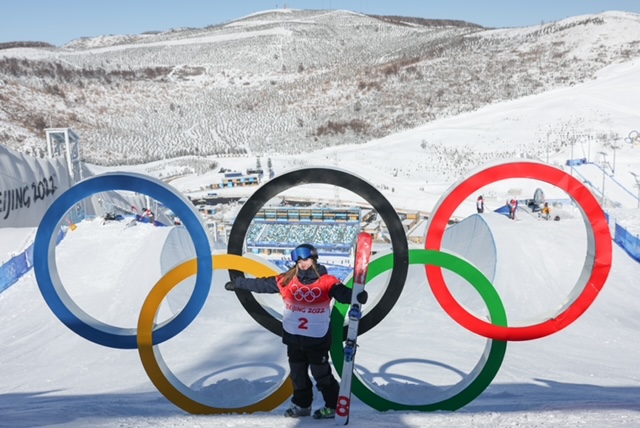
But these people are winter athletes. Why are they complaining about the cold?
Turns out, not all of them are.
“Yeah it was pretty cold but I definitely thought it was going to be worse,” Zoe says. “My expectations were that it was going to be freezing because everyone was talking about it, but when we got there it actually wasn’t that bad. I’ve definitely skied in colder temperatures. It was more like cold enough for the snow to be pretty slow. And it was definitely windy.”
Speaking of expectations, Team GB set its own medal tally at a not-so-modest target. Never destined to top the table, there was at least a handful of promising athletes in the mix who might have brought some metal home. But as the days passed, one podium after another disappeared. Kirsty Muir, silver medallist at the Lausanne Youth Winter Olympics in 2020, narrowly missed out in big air. Charlotte Bankes, reigning SBX World Champion, was unable to progress beyond the quarter finals. Headlines like ‘No panic’ over lack of GB medals appeared as the Games wore on and not till Thursday 10th, the day before Zoe’s halfpipe final, did GB finally manoeuvre themselves into medal position thanks to the curling team.
How did Zoe Atkin, bronze medallist from last year’s World Championships and no stranger to the podium, deal with the pressure?
“I think there’s that kind of pressure in most sports, including mine, and I always feel that pressure. But I think a lot of the pressure comes from what I feel myself, what my expectations of my performance are – like how I think it should go and what I think the result should be. And one of the things I’m working on right now is really trying to scale that back, and think about specific tricks and certain things that I’m working on. You know, instead of thinking: if I do this, and tomorrow I do this and the next day I do that and then if I land all that in one thing then maybe I can podium – it’s like too much to put in your mind all at once if you’re just trying to train on the first day of training. So I think mitigating pressure is something that I’ve been working on for a long time now, just because I put so much pressure on myself for my own results. But I honestly feel like I’m pretty good at performing under pressure, so I try to take a little bit of that and implement it. But I really want to enjoy my time and I feel like a lot of people in our sport just genuinely love what they do and enjoy doing it, and that can kind of take the pressure off because it’s like, yeah I’m competing and yeah this is the biggest event in my sport and yeah millions of people are watching but I’m also doing what I love, and this is so much fun and I’m going to put together a run that I’m gonna really enjoy training for and completing. You know you have to love it to want to go through that fear of trying something new and something dangerous, like we do.”
But these people are winter athletes. Why are they complaining about the cold?
Turns out, not all of them are.
“Yeah it was pretty cold but I definitely thought it was going to be worse,” Zoe says. “My expectations were that it was going to be freezing because everyone was talking about it, but when we got there it actually wasn’t that bad. I’ve definitely skied in colder temperatures. It was more like cold enough for the snow to be pretty slow. And it was definitely windy.”
Speaking of expectations, Team GB set its own medal tally at a not-so-modest target. Never destined to top the table, there was at least a handful of promising athletes in the mix who might have brought some metal home. But as the days passed, one podium after another disappeared. Kirsty Muir, silver medallist at the Lausanne Youth Winter Olympics in 2020, narrowly missed out in big air. Charlotte Bankes, reigning SBX World Champion, was unable to progress beyond the quarter finals. Headlines like ‘No panic’ over lack of GB medals appeared as the Games wore on and not till Thursday 10th, the day before Zoe’s halfpipe final, did GB finally manoeuvre themselves into medal position thanks to the curling team.
How did Zoe Atkin, bronze medallist from last year’s World Championships and no stranger to the podium, deal with the pressure?
“I think there’s that kind of pressure in most sports, including mine, and I always feel that pressure. But I think a lot of the pressure comes from what I feel myself, what my expectations of my performance are – like how I think it should go and what I think the result should be. And one of the things I’m working on right now is really trying to scale that back, and think about specific tricks and certain things that I’m working on. You know, instead of thinking: if I do this, and tomorrow I do this and the next day I do that and then if I land all that in one thing then maybe I can podium – it’s like too much to put in your mind all at once if you’re just trying to train on the first day of training. So I think mitigating pressure is something that I’ve been working on for a long time now, just because I put so much pressure on myself for my own results. But I honestly feel like I’m pretty good at performing under pressure, so I try to take a little bit of that and implement it. But I really want to enjoy my time and I feel like a lot of people in our sport just genuinely love what they do and enjoy doing it, and that can kind of take the pressure off because it’s like, yeah I’m competing and yeah this is the biggest event in my sport and yeah millions of people are watching but I’m also doing what I love, and this is so much fun and I’m going to put together a run that I’m gonna really enjoy training for and completing. You know you have to love it to want to go through that fear of trying something new and something dangerous, like we do.”
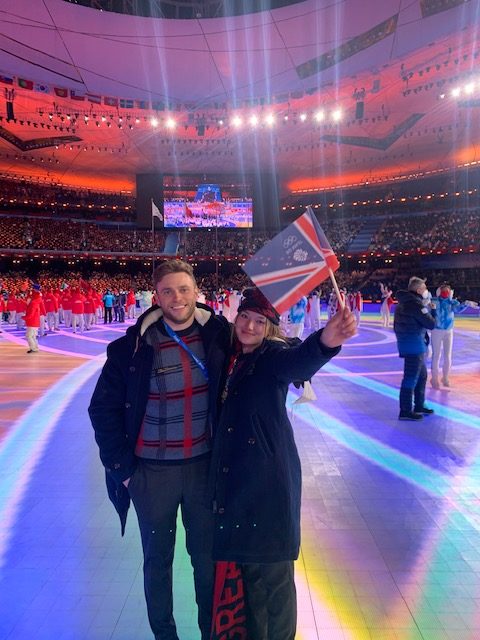
Zoe finished 9th in the halfpipe final, a performance that left her visibly disappointed and, for one of the best few halfpipe skiers in the world, understandably so. Freestyle skiing, as with its snowboard counterpart, is evolving at a relentless pace. For perspective, an alpine skier might be a couple of tenths of a second faster than his or her equal from a decade earlier, but in the freestyle events that same passing of time heralds a whole extra rotation. Or even two. Performances increase by 25% on that metric, not fractionally. Which adds up to the inescapable fact that today’s freeskiers are the best in history. Despite that, luminaries like Cassie Sharpe, Brita Sigourney, Kelly Sildaru, Rachael Karker and of course Eileen Gu, are within Zoe’s sights on any given day.
At Beijing the qualifiers went according to plan and Zoe put herself comfortably through to the final. And despite some solid qualifying runs there was more in the tank.
“I definitely wasn’t going into the finals thinking of trying tricks I hadn’t done before but they were newer tricks that I wanted to land. I definitely don’t think that I’m spontaneous in the way that I ski. I think I’m very planned and meticulous about my skiing, and when I learn new tricks and what grab I’m going to put in there. Because I find that it organises it in my brain and the way I have to do certain tricks is like a series of actions, and I have to hit all these things to do a trick perfectly because there are a lot of different variables going on. And I definitely want to know when I’m going to try something new and how it’s going to go. And I plan it perfectly.”
Zoe finished 9th in the halfpipe final, a performance that left her visibly disappointed and, for one of the best few halfpipe skiers in the world, understandably so. Freestyle skiing, as with its snowboard counterpart, is evolving at a relentless pace. For perspective, an alpine skier might be a couple of tenths of a second faster than his or her equal from a decade earlier, but in the freestyle events that same passing of time heralds a whole extra rotation. Or even two. Performances increase by 25% on that metric, not fractionally. Which adds up to the inescapable fact that today’s freeskiers are the best in history. Despite that, luminaries like Cassie Sharpe, Brita Sigourney, Kelly Sildaru, Rachael Karker and of course Eileen Gu, are within Zoe’s sights on any given day.
At Beijing the qualifiers went according to plan and Zoe put herself comfortably through to the final. And despite some solid qualifying runs there was more in the tank.
“I definitely wasn’t going into the finals thinking of trying tricks I hadn’t done before but they were newer tricks that I wanted to land. I definitely don’t think that I’m spontaneous in the way that I ski. I think I’m very planned and meticulous about my skiing, and when I learn new tricks and what grab I’m going to put in there. Because I find that it organises it in my brain and the way I have to do certain tricks is like a series of actions, and I have to hit all these things to do a trick perfectly because there are a lot of different variables going on. And I definitely want to know when I’m going to try something new and how it’s going to go. And I plan it perfectly.”
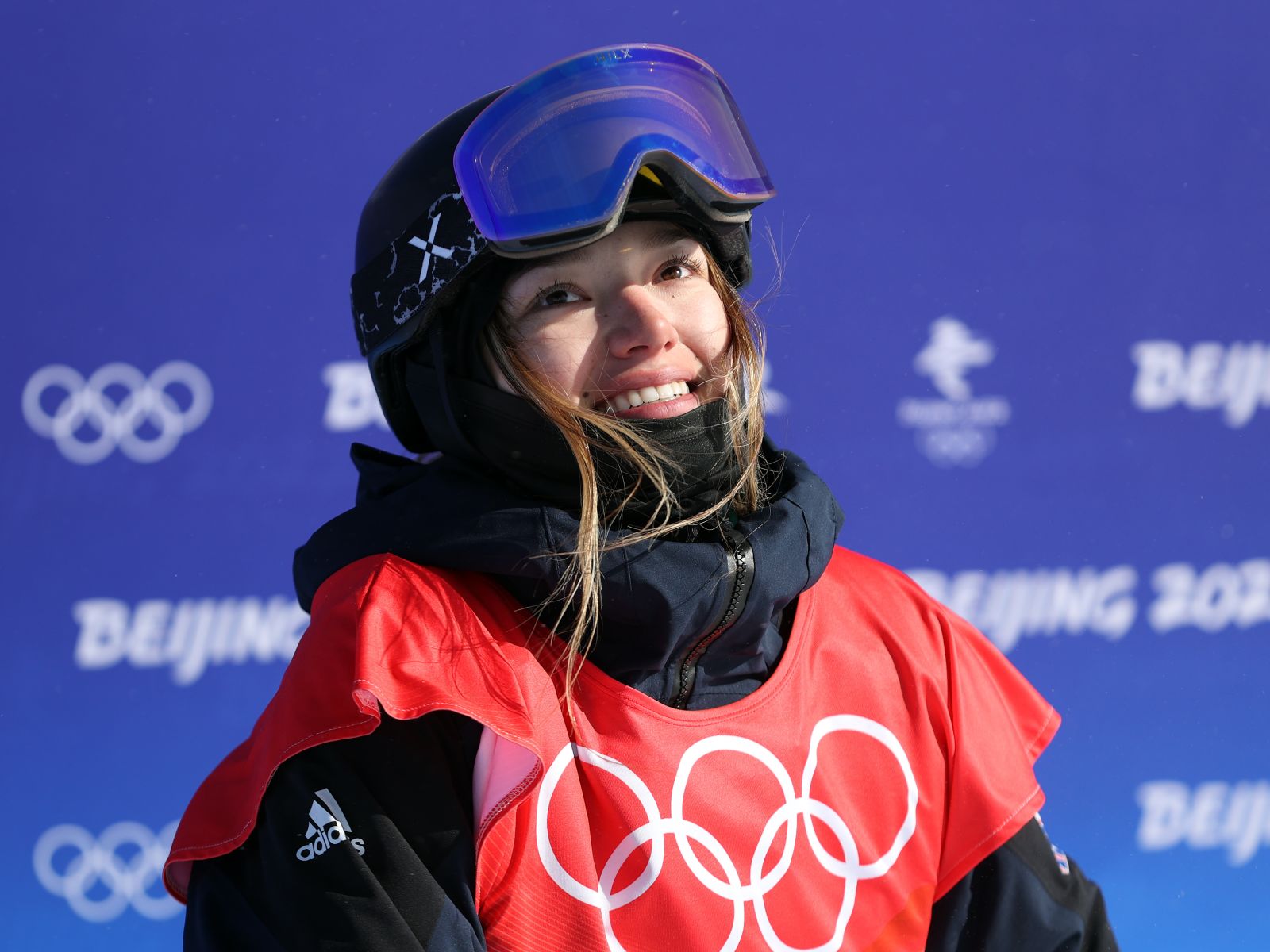
Zoe Atkin is one of the top few athletes in today’s halfpipe crop – and therefore in history – but freeskiing is shotgun justice: two split-second misjudgements and her medal hopes were snatched away. We never got to see what might well have been another podium finish, but Zoe adhered to the code of freestyle winter athletes since time immemorial: just send it – there’s no room for caution.
Which is why her sport goes form strength to strength at lightning pace, and why, always near the top of the class, she’s a success with or without an Olympic medal. And at 19 Zoe has sufficient youth on her side for two, maybe even three more Olympic cycles. Which is exciting, because there are tricks in the closet to put her in the top three or four at all the big competitions, including the Games.
Nonetheless, as we arrive at the tail end of the winter season, now’s a time to step back. Which means taking a breather and climbing out of the elite athlete’s punishing routine. Zoe won’t be idle but time off, she says, is good for the soul.
“Time off means not getting up and training every day. For the last four years I’ve been really focused on this, like hyper-fixated on this one thing, which was the Olympics. And then it all climaxes and at the end you’re left feeling like wow, I can’t believe that’s over. And I’ve spent four years waking up early, getting to the hill, training all day, going to the gym. And not all for this moment, but a good deal of that effort was for the Olympics. And I think now that I don’t have that obligation, I just want to take some time for myself, have a couple months off skiing, and I think that will be really good for me to clear my mind, get some motivation, and come back into it and keep skiing.”
When we asked Lindsey Jacobellis about the magnitude of the Olympics, she maintained it was just one event in the many that she competes in (and yes, we’re hoping to put that same question to her again post-Olympic gold). And it’s true: alongside the perennial World Cup circuit, there’s the World Championships, Dew Tour, X-Games and countless national and local competitions. Unquestionably the Olympics isn’t the be all and end all. But it does offer cadence to the athlete’s evolution, a metronome by which more than a few participants measure their progress. The trick is not to let it hog the limelight.
“Definitely in the back of my head I’m thinking far into the future, and I am thinking a little bit about the next Olympics. But I’m also trying to reel myself back in because it’s four years away and four years is a long time. Even in one year a lot can change, and I want to pace myself. I don’t want to burn myself out right before the Olympics, so I think that time off will really help me relax and kind of find that love again when I feel ready. But I’m also thinking one year at a time, and what I want to accomplish for this year and the next year and so on.”
Zoe Atkin is one of the top few athletes in today’s halfpipe crop – and therefore in history – but freeskiing is shotgun justice: two split-second misjudgements and her medal hopes were snatched away. We never got to see what might well have been another podium finish, but Zoe adhered to the code of freestyle winter athletes since time immemorial: just send it – there’s no room for caution.
Which is why her sport goes form strength to strength at lightning pace, and why, always near the top of the class, she’s a success with or without an Olympic medal. And at 19 Zoe has sufficient youth on her side for two, maybe even three more Olympic cycles. Which is exciting, because there are tricks in the closet to put her in the top three or four at all the big competitions, including the Games.
Nonetheless, as we arrive at the tail end of the winter season, now’s a time to step back. Which means taking a breather and climbing out of the elite athlete’s punishing routine. Zoe won’t be idle but time off, she says, is good for the soul.
“Time off means not getting up and training every day. For the last four years I’ve been really focused on this, like hyper-fixated on this one thing, which was the Olympics. And then it all climaxes and at the end you’re left feeling like wow, I can’t believe that’s over. And I’ve spent four years waking up early, getting to the hill, training all day, going to the gym. And not all for this moment, but a good deal of that effort was for the Olympics. And I think now that I don’t have that obligation, I just want to take some time for myself, have a couple months off skiing, and I think that will be really good for me to clear my mind, get some motivation, and come back into it and keep skiing.”
When we asked Lindsey Jacobellis about the magnitude of the Olympics, she maintained it was just one event in the many that she competes in (and yes, we’re hoping to put that same question to her again post-Olympic gold). And it’s true: alongside the perennial World Cup circuit, there’s the World Championships, Dew Tour, X-Games and countless national and local competitions. Unquestionably the Olympics isn’t the be all and end all. But it does offer cadence to the athlete’s evolution, a metronome by which more than a few participants measure their progress. The trick is not to let it hog the limelight.
“Definitely in the back of my head I’m thinking far into the future, and I am thinking a little bit about the next Olympics. But I’m also trying to reel myself back in because it’s four years away and four years is a long time. Even in one year a lot can change, and I want to pace myself. I don’t want to burn myself out right before the Olympics, so I think that time off will really help me relax and kind of find that love again when I feel ready. But I’m also thinking one year at a time, and what I want to accomplish for this year and the next year and so on.”
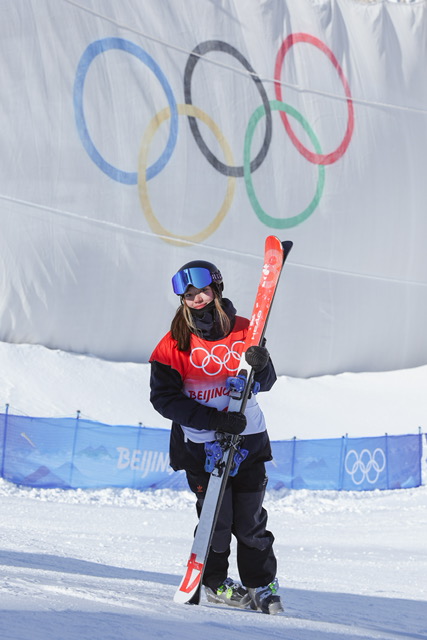
And now, as her season draws to a close, Zoe can shift focus to life outside the halfpipe.
“Right now I’m not really thinking about it because there’re no competitions left for the rest of the season, and there’s probably like two months left of actual skiing in the winter season. So I’m thinking I’ll just chill for the rest of the season and maybe I’ll ski towards the end – maybe in a couple of weeks. And then I’ll probably come back to training for spring camps in May and do some of that, maybe some summer training and all that stuff.”
But despite the ups and downs, Beijing 2022 wasn’t a bad dream for Zoe. She’s learned a lot about a competition which, if not more important than the others, is certainly conducted on a grander scale. Maybe she’s even learned about setting her alarm (or the new-found benefits of not doing?) for Olympic competitions: yes, Zoe almost overslept on the morning of the qualifiers.
“I did. It’s embarrassing! Me and my coach set a time that we were going to meet at the front of the building to walk to breakfast and then go to the venue, and he knocked on my door, and I woke up to the knocking and I was like, ‘Oh no!’ And then I opened the door and I was like – uh, I set an alarm but I set it for the PM. When I open my phone and set it, it automatically sets it for the PM and you have to change it to the AM, and I didn’t. And that was at the time I had to leave so I kind of rushed through my whole morning routine and it was fine, we got there on time. And maybe it was good, because I wasn’t thinking about it all morning – I tend to overthink things and I thought about the competition less because I was just thinking, oh my God, I have to get all my stuff and where’s my bib, I need to find it – and just running around. And I skied really well that day so maybe that’s my new trick – not setting an alarm.”
And even though she’s half-joking, that session turned out pretty well. Zoe put in two solid runs to qualify in fourth place with 86.75 points, a score that would have been good enough for fifth in the final. For a halfpipe skier capable of hitting 90 plus, an improvement on that was absolutely on the cards. But two falls put paid to that (let’s not get into whether or not she set her alarm on finals day) and that, as is so brutally often the case in freeskiing, was that.
And now, as her season draws to a close, Zoe can shift focus to life outside the halfpipe.
“Right now I’m not really thinking about it because there’re no competitions left for the rest of the season, and there’s probably like two months left of actual skiing in the winter season. So I’m thinking I’ll just chill for the rest of the season and maybe I’ll ski towards the end – maybe in a couple of weeks. And then I’ll probably come back to training for spring camps in May and do some of that, maybe some summer training and all that stuff.”
But despite the ups and downs, Beijing 2022 wasn’t a bad dream for Zoe. She’s learned a lot about a competition which, if not more important than the others, is certainly conducted on a grander scale. Maybe she’s even learned about setting her alarm (or the new-found benefits of not doing?) for Olympic competitions: yes, Zoe almost overslept on the morning of the qualifiers.
“I did. It’s embarrassing! Me and my coach set a time that we were going to meet at the front of the building to walk to breakfast and then go to the venue, and he knocked on my door, and I woke up to the knocking and I was like, ‘Oh no!’ And then I opened the door and I was like – uh, I set an alarm but I set it for the PM. When I open my phone and set it, it automatically sets it for the PM and you have to change it to the AM, and I didn’t. And that was at the time I had to leave so I kind of rushed through my whole morning routine and it was fine, we got there on time. And maybe it was good, because I wasn’t thinking about it all morning – I tend to overthink things and I thought about the competition less because I was just thinking, oh my God, I have to get all my stuff and where’s my bib, I need to find it – and just running around. And I skied really well that day so maybe that’s my new trick – not setting an alarm.”
And even though she’s half-joking, that session turned out pretty well. Zoe put in two solid runs to qualify in fourth place with 86.75 points, a score that would have been good enough for fifth in the final. For a halfpipe skier capable of hitting 90 plus, an improvement on that was absolutely on the cards. But two falls put paid to that (let’s not get into whether or not she set her alarm on finals day) and that, as is so brutally often the case in freeskiing, was that.
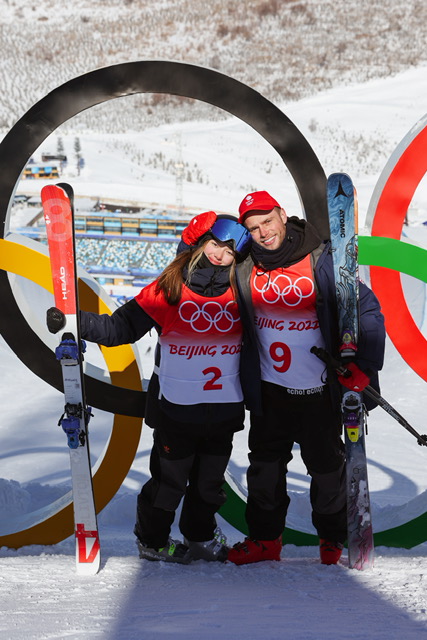
But there are other treasures to be had from the Olympics. Memories, development of character – all the usual nuts and bolts that will no doubt go into the mix of Zoe’s future and the stellar skiing career that lies ahead. And then there are those tangible rewards of her time in Beijing: anyone who’s seen Zoe’s Instagram feed will know about her affiliation for Olympic pin trading.
“Oh let’s talk about it, this is my favourite topic. Okay so every country gets a certain number of pins. So we got packs of twenty, and sometimes it’s just one kind of pin, and sometimes it’s a lot. So the US team got a lot of different kinds of pins and Team GB just got one pin. And then you have this little collection of pins, and you go around to other athletes from different countries – and you can spot them in the dining hall because we’re all wearing our team kits so there’ll be a huge word on the back, like the Iran team or whatever – and then you go and try and convince them to change their pins with yours. And sometimes it can be really hard, because they don’t want your pin or they already have your pin so you have to like trade gear or you have to find someone else. But our pins this year were really good – everybody wanted them so I didn’t have problems trading mine. I got a really cool collection, if I do say so myself. I’m really proud of my pins.” Pin trading, it transpires, is a game of supreme tactics – an example of strategy to rival any of the televised events. “You usually get packs of twenty and sometimes if you ask you can get more, but I asked for more and they said no. So you have to be kind of stingy with your pins because you don’t want the too-common ones or to run out on all the lame ones – you want to save your pins for all the cool countries with cool pins.”
Maybe it needs to be an Olympic event in itself?
“I agree, I think I would smash that one.”
Perhaps the Winter Olympics is the zenith of competition, and perhaps it’s not. But it is unique and it is big. Maybe it comes down to commercialism, but there’s a global allure that sets the Games apart from the World Championships, X Games et al. Maybe it’s the scale of the event. Maybe it’s the politics. Maybe it’s the Rings and all they symbolise.
But whatever status the Winter Olympics occupies on the circuit, no one trades pins at the other competitions.
But there are other treasures to be had from the Olympics. Memories, development of character – all the usual nuts and bolts that will no doubt go into the mix of Zoe’s future and the stellar skiing career that lies ahead. And then there are those tangible rewards of her time in Beijing: anyone who’s seen Zoe’s Instagram feed will know about her affiliation for Olympic pin trading.
“Oh let’s talk about it, this is my favourite topic. Okay so every country gets a certain number of pins. So we got packs of twenty, and sometimes it’s just one kind of pin, and sometimes it’s a lot. So the US team got a lot of different kinds of pins and Team GB just got one pin. And then you have this little collection of pins, and you go around to other athletes from different countries – and you can spot them in the dining hall because we’re all wearing our team kits so there’ll be a huge word on the back, like the Iran team or whatever – and then you go and try and convince them to change their pins with yours. And sometimes it can be really hard, because they don’t want your pin or they already have your pin so you have to like trade gear or you have to find someone else. But our pins this year were really good – everybody wanted them so I didn’t have problems trading mine. I got a really cool collection, if I do say so myself. I’m really proud of my pins.” Pin trading, it transpires, is a game of supreme tactics – an example of strategy to rival any of the televised events. “You usually get packs of twenty and sometimes if you ask you can get more, but I asked for more and they said no. So you have to be kind of stingy with your pins because you don’t want the too-common ones or to run out on all the lame ones – you want to save your pins for all the cool countries with cool pins.”
Maybe it needs to be an Olympic event in itself?
“I agree, I think I would smash that one.”
Perhaps the Winter Olympics is the zenith of competition, and perhaps it’s not. But it is unique and it is big. Maybe it comes down to commercialism, but there’s a global allure that sets the Games apart from the World Championships, X Games et al. Maybe it’s the scale of the event. Maybe it’s the politics. Maybe it’s the Rings and all they symbolise.
But whatever status the Winter Olympics occupies on the circuit, no one trades pins at the other competitions.
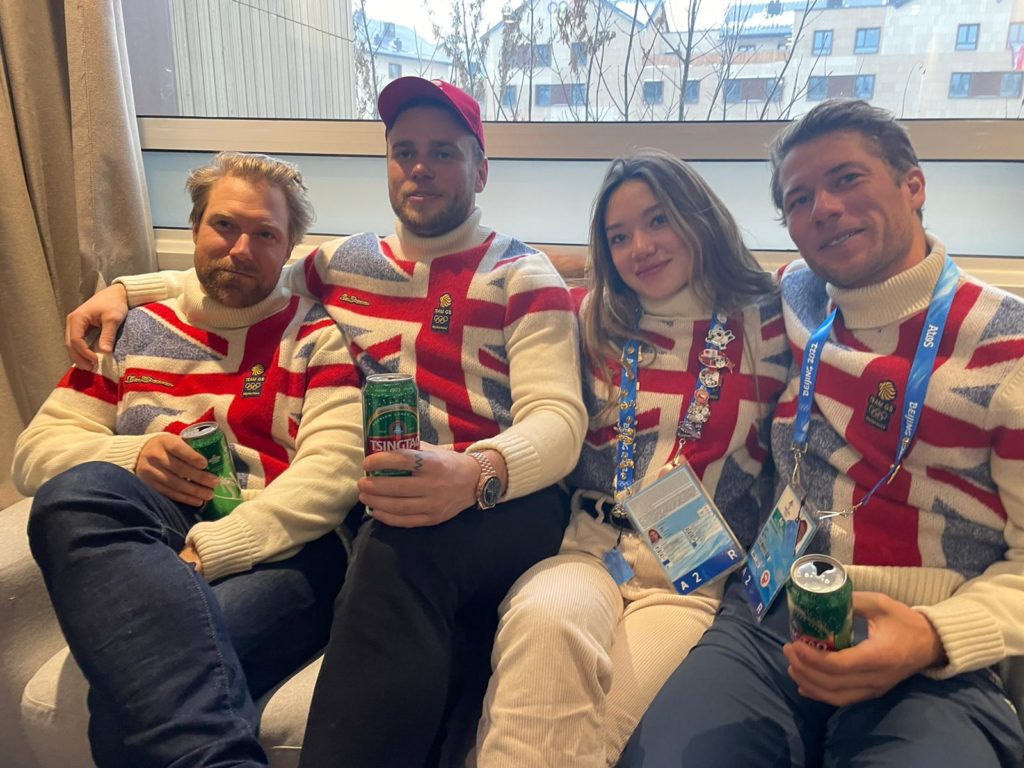
My thanks to Zoe Atkin for her time and insight into her Olympic experience. You can keep up to date with Zoe’s career on her social feed below.
Zoe Atkin Instagram: @zoeaatkin
Related article: Arielle Gold
